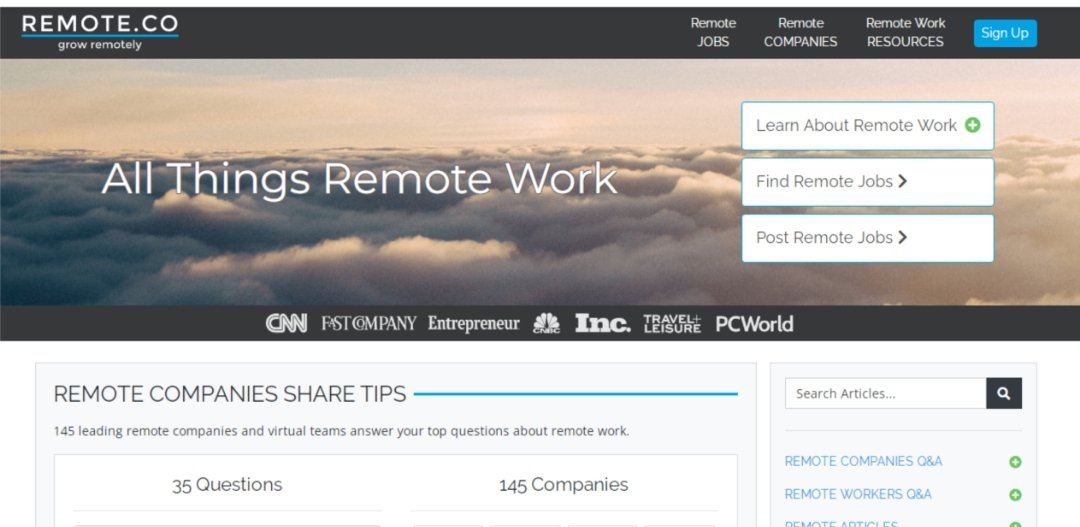How to Secure Entry-Level Remote Software Development Jobs
Are you a fresh graduate looking for remote work to keep yourself busy while earning and gaining more experience? The remote software development field is no exception as the world of remote work continues to gain popularity. Imagine coding away in your pyjamas, with the freedom to work from anywhere in the world – that’s the benefit of entry-level remote software development jobs.
For aspiring developers, these positions offer unique flexibility and opportunities for growth. companies are embracing remote work like never before. They’re realizing that talent knows no bounds and are tapping into a global pool of developers. Everyone’s joining the remote work trend, from startups to tech giants.
In this ultimate guide, we’ll discuss the world of entry-level remote software development jobs, explaining the benefits and strategies to help you land your dream role.
Essential Skills and Qualifications
Landing an entry-level remote software development job isn’t just about knowing how to code – although that’s definitely a big part of it. But you need to have the right mix of technical understanding and soft skills to stand out from the crowd.
ALSO READ: Your Ultimate Guide to Remote Data Entry Jobs
First, let’s tackle the technical side of things. When it comes to programming languages, you’ll want to have a solid knowledge of the basics like Java, Python, JavaScript, or C#. Familiarity with popular frameworks and tools like React, Angular, Node.js, or Git can also give you a leg up in the game.

But employers aren’t just looking for code experts. They want team players who can communicate effectively, think critically, and solve problems like a boss. So don’t sleep on those non-technical skills. Brush up on your communication skills – whether it’s through written emails or video calls. Practice your problem-solving abilities by tackling coding challenges or working on real-world projects.
Now, let’s talk strategy. How do you showcase these skills to potential employers? Start by building up your portfolio with passion projects, internships, or certifications. Build cool stuff, collaborate with others, and document your journey along the way. Trust me, nothing speaks louder than a killer portfolio showing your skills and expertise.
Crafting an Impressive Resume and Cover Letter
Your resume and cover letter are your tickets to the big leagues of remote software development. But crafting them is not that easy. Lucky for you, I’ve got some insider tips to help you.
Resume
When it comes to remote software development positions, you need to tailor it well. Start off with a clean and concise arrangement. Show your relevant projects, experiences, and achievements front and center. Did you build a killer app or contribute to an open-source project? You have every right to shout it from the rooftops. And don’t forget to add some keywords – you know, the ones that’ll make those annoying ATS bots sit up and take notice.
Cover Letter
This is your chance to shine, so don’t hold back. Show off your passion, your skills, and why you’re the perfect fit for remote work culture. But here’s the secret – keep it personal. There’s nothing like that generic “To whom it may concern” nonsense. Address it to a real human being, and let your person through. And if you’ve got an unpredictable solution or two to share, go for it. Just make sure it’s relevant to the job at hand.
Exploring the Remote Job Search
Let’s get into the world of remote job hunting. Trust me, it’s a jungle out there, but with the right tools and tactics, you’ll be in the best position to explore easily and land your desired entry-level software development jobs in no time.

Online Platforms and Job Boards
Think of Online platforms and job boards as your bread and butter, your virtual guide to success, leading you straight to the pot of gold – that sweet entry-level remote software development job. Sites like LinkedIn, Hamtem, Remote.co, and We Work Remotely are goldmines for remote job seekers. So don’t be shy – start checking those listings like a seasoned prospector.
But here’s the thing – with great power comes great responsibility. You need to know how to separate the wheat from the chaff. Filter those job listings like a boss, focusing on entry-level opportunities that match your skills and experience. Don’t waste your time chasing after senior-level positions or opportunities that are way out of your league. Stay focused and stay hungry.
Networking
It’s not just about what you know but who you know. So get out there and start meeting with the movers and shakers in the remote work community. Attend virtual events, join online communities, and strike up conversations with fellow developers. You never know when a casual chat could turn into a golden opportunity.
And don’t forget to think outside the box. Sometimes, the best jobs aren’t advertised – they’re hidden prizes waiting to be discovered. So keep your ear to the ground, stay open to new opportunities, and don’t be afraid to take a step with faith.
Mastering the Remote Interview Process
It’s time to tackle the remote interview process like an experienced professional. Trust me, it’s not as difficult as it sounds. With a bit of preparation and a lot of confidence, you’ll be accomplishing those interviews left and right.
We’ll start with interview formats. When it comes to remote software development roles, you can expect a variety of formats, from technical assessments to good old-fashioned video interviews. Each format has its own strange habits and challenges, so it’s important to know what you’re up against.
You wouldn’t go into battle without sharpening your sword, right? The same goes for interviews. Brush up on your technical skills, review your coding fundamentals, and practice solving those annoying algorithm questions. Plenty of resources exist – from coding challenge websites to mock interview platforms – so take advantage of them.
But here’s the thing – it’s not just about what you know, but how you communicate it. During remote interviews, effective communication is key. Make sure to articulate your thoughts clearly and concisely, and don’t be afraid to ask questions or seek clarification if something’s not clear. And don’t forget to show your skills and experience – whether it’s through a killer portfolio, a GitHub repository, or a live coding demonstration.

Negotiating Salary and Benefits
The moment you’ve been waiting for – negotiating that sweet salary and those juicy benefits for your entry-level remote software development job. It’s time to put on your negotiating cap and make sure you’re getting the compensation you deserve.
Different organizations offer different salary packages for entry-level remote software development jobs. From startups to tech giants, the average salary can vary widely. It’s essential to do your homework and research the average salary range for your desired role in your specific location or industry. Websites like Glassdoor, PayScale, and LinkedIn can be valuable resources for gathering this information.
Once you’ve got an average figure in mind, it’s time to put your negotiation skills to the test. Remember, negotiation isn’t about being aggressive or confrontational but finding a mutually beneficial solution. Start by showing your value and expertise, highlighting your skills and experiences that make you a valuable asset to the company.
When it comes to negotiation tips, here’s a golden rule – be prepared to walk away. Know your bottom line and stick to it. But also be open to compromise and creative solutions. Maybe the company can’t meet your salary expectations, but they can offer additional benefits like flexible hours, remote work allowances, or professional development opportunities. Don’t underestimate the value of these packages – they can make a significant difference in your overall job satisfaction and work-life balance.
Throughout the negotiation process, maintain professionalism and bond with your potential employer. Remember, it’s not personal – it’s business. Be respectful and humble, and show confidence in expressing your needs and expectations. And if the negotiation doesn’t go your way, don’t sweat it. Plenty of fish are in the sea, and the right opportunity is out there waiting for you.
Ensuring Success in a Remote Work Environment
What’s your plan to set yourself up for success in the remote work game? Working from home might sound like a dream come true – no commute, no dress code, no annoying office politics – but trust me, it comes with its own set of challenges. But fear not; you can grow in a remote work environment with the right strategies and mindset.
First, let’s talk about your home office setup. Creating a dedicated workspace that’s comfortable and conducive to productivity is key. Invest in a good chair, set up proper lighting, and make sure you’ve got all the tools you need at your fingertips – whether it’s a high-speed internet connection, a second monitor, or noise-cancelling headphones. And don’t forget to personalize your space with a few touches that inspire creativity and motivation.
ALSO READ: Work from Home Customer Service Jobs: Everything You Should Know!
Another consideration is communication and collaboration. When you’re working remotely, staying connected with your team is essential. Make use of communication tools like Slack, Zoom, or Microsoft Teams to stay in touch, share ideas, and collaborate on projects. Schedule regular check-ins with your team to keep everyone on the same page and build a sense of teamwork– even if you’re miles apart.
But here’s the thing – remote work can make it difficult to draw a line between work and personal life if you’re not careful. That’s why it’s crucial to establish boundaries and stick to them. Set specific work hours, take regular breaks, and resist the temptation to check your email or Slack outside of those hours. And don’t forget to make time for self-care and relaxation – whether it’s going for a walk, practicing yoga, or indulging in your favourite hobby. Remember, a healthy work-life balance is key to long-term success and happiness.






